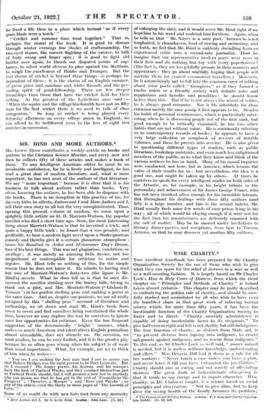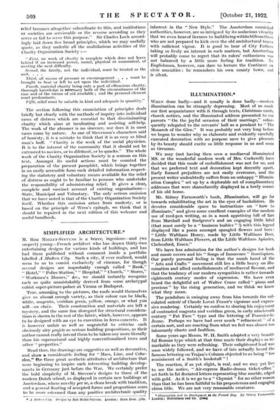WISE CHARITY.* Tins excellent handbook has been prepared by the
Charity Organization Society for the use of those who wish to give what they can spare for the relief of distress in a wise as well as a well-meaning fashion. It is largely based on Sir Charles Loch's How to Help Cases of Distress, from which the third chapter on " Principles and Methods of Charity " is indeed taken almost verbatim. This chapter may be justly described as embodying the golden rule of charity, and should be care- fully studied and assimilated by all who wish to have even the humblest share in that great work of relieving human misery which, for more than fifty years, it has been the inestimable function of the Charity Organization Society to foster and to direct. " Charity unwisely administered is capable of doing incalculable harm to its recipients." To give half-crowns right and left is not charity but self-indulgence. The true function of charity, as distinct from State aid, is " to prevent distress from lapsing into indigence, to create safeguards against indigence, and to rescue from indigence." To this end, as Sir Charles Loch so well said, " money indeed is needed, but it is useless without knowledge, understanding and effort." Miss Octavio. Hill laid it down as a rule for all her workers : " Never touch a case unless you have a plan, and never leave it till you have exhausted the possibilities." Charity should aim at curing and not merely at alleviating distress. The great fault of indiscriminate almsgiving is that it tends to sap energy and to impair character. Wige charity, as Dr. Chalmers taught, is a science based on social principles and observation. " Not to give alms, but to keep alive the saving health of the family becomes its problem ; • The Prevention and Retie f of Diatom, London ; E. S. King and Charity Organiza- tion Society. I2 d. ed: net
relief becomes altogether subordinate•to this, and institutions or societies are serviceable or the reverse according as they serve or fail to serve this purpose." Sir Charles Loch accord- ingly laid down five broad principles, which we may usefully quote, as they underlie all the multifarious activities of the Charity Organization.Society :—
" First, no work of charity is complete which does not leave behind it an increased power, moral, physical or economical, of meeting the next difficulty.
Second, the family, not the individual, must be treated as the unit. . . .
Third, all means of pressure or encouragement . . . brought to bear or left to act upon the individual.
Fourth, material charity being only a part of efficacious charity, thorough knowledge is necessary both of the circumstances of the case and of the means of aid available ; and the personal clement must predominate.
Filth, relief must be suitable in kind and adequate in quantity."
The section following this enunciation of principles deals briefly but clearly with the methods of inquiry into individual cases of distress which are essential to that discriminating charity which aims at inculcating and assisting self-help.
The work of the almoner is no sinecure, nor does it in most cases come by nature. As one of Stevenson's characters said of honesty, it is a mistake to think that it is as easy as blind man's buff. " Charity is the work of the social physician.
It is to the interest of the community that it should not be entrusted to novices, or to dilettanti, or to quacks." The whole work of the Charity Organization Society is a sermon on this
text. Amongst its useful actions must be counted the preparation of the present pamphlet, which brings together in an easily accessible form such detailed information respect- ing the statutory and voluntary means available for the relief of distress as ought to be familiar to persons who undertake the responsibility of administering relief. It gives a clear, complete and succinct account of existing organizations— State, Municipal and Voluntary. The only serious omission that we have noted is that of the Charity Organization Society itself. 'Whether this omission arises from modesty, or is based on the principle of Wren's epitaph, we think that it should be repaired in the next edition of this welcome and useful handbook. must be



































































 Previous page
Previous page